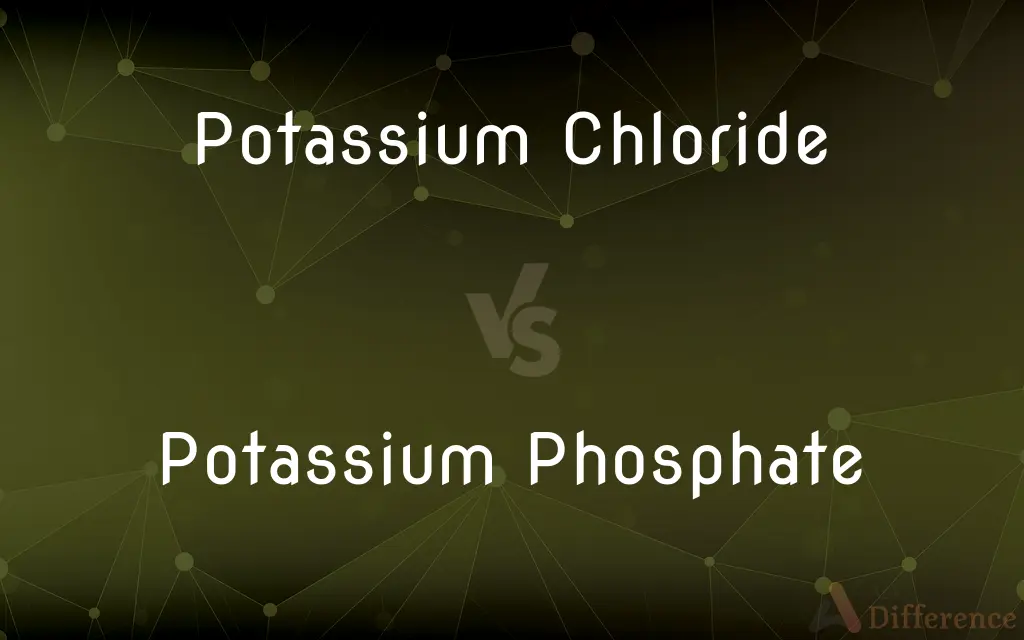Potassium Chloride vs. Potassium Phosphate — What's the Difference?
By Tayyaba Rehman — Published on November 13, 2023
Potassium Chloride (KCl) is a salt used in medicine and food processing, providing potassium. Potassium Phosphate (K3PO4) is used to produce fertilizers and soft soaps and to regulate pH levels in various products.

Difference Between Potassium Chloride and Potassium Phosphate
Table of Contents
ADVERTISEMENT
Key Differences
Potassium Chloride is a metal halide salt composed of potassium and chlorine, widely used in medical treatments, and known for its role in maintaining proper cell function. It is also recognized as a salt substitute in the food industry, showcasing its relevance in nutrition. On the other hand, Potassium Phosphate is a potassium salt of phosphoric acid utilized largely in agriculture, known to enhance plant growth by replenishing the soil’s potassium levels and balancing pH in food.
Potassium Chloride, with its relatively simple structure, is often used in medical applications, notably in IV fluids to treat low potassium levels in the blood, a condition known as hypokalemia. Whereas Potassium Phosphate, in addition to its agricultural uses, often finds a place in the food industry as an emulsifier, stabilizer, and nutrient source, reflecting its multifaceted applications.
In the realm of agriculture, Potassium Chloride is a pivotal fertilizer, boosting potassium in the soil and thereby fostering plant health. Meanwhile, Potassium Phosphate is hailed for its capacity to replenish phosphate levels in the soil, facilitating optimal plant growth and helping prevent disease and pest issues in various crops.
Despite their unique individual roles, both Potassium Chloride and Potassium Phosphate converge in their utility in the food industry, albeit serving different functions. Potassium Chloride can act as a salt substitute, while Potassium Phosphate commonly works to modify pH levels in certain food products.
While Potassium Chloride is utilized significantly in medical, food, and agricultural settings, Potassium Phosphate stretches its utility from agricultural realms to industrial applications, indicating that their applications, while overlapping in certain sectors, pivot on distinct chemical properties and functionalities.
ADVERTISEMENT
Comparison Chart
Chemical Formula
KCl
K3PO4
Primary Usage
Medical treatment & food
Fertilizer & food industry
Color
White or colorless
White
Solubility in Water
Highly soluble
Soluble
PH Level
Typically neutral
Typically alkaline
Compare with Definitions
Potassium Chloride
Industrial Chemical
In industries, Potassium Chloride is employed in the production of other chemicals.
Potassium Phosphate
Nutrient Source
Some supplements contain Potassium Phosphate to boost potassium and phosphorus intake.
Potassium Chloride
Electrolyte Regulator
Potassium Chloride helps maintain electrolyte balance in bodily fluids.
Potassium Phosphate
Fertilizer Component
Potassium Phosphate is commonly applied to crops to enhance phosphate levels.
Potassium Chloride
Medical Salt
Doctors often prescribe Potassium Chloride to treat hypokalemia.
Potassium Phosphate
Food Industry Agent
Within foods, Potassium Phosphate can act as an emulsifier.
Potassium Chloride
Agricultural Input
Farmers use Potassium Chloride to enhance potassium levels in the soil.
Potassium Phosphate
Buffering Agent
In laboratories, Potassium Phosphate is used to control pH levels in solutions.
Potassium Chloride
Food Additive
Potassium Chloride is utilized as a salt substitute in various low-sodium products.
Potassium Phosphate
Industrial Substance
Potassium Phosphate is utilized in various manufacturing processes, including soap production.
Common Curiosities
Can Potassium Phosphate be used as a fertilizer?
Yes, Potassium Phosphate is a popular fertilizer, enhancing soil phosphate levels and aiding plant growth.
What is Potassium Chloride commonly used for?
Potassium Chloride is widely used in medical treatments for hypokalemia and as a potassium source in food.
Can Potassium Chloride be used to melt ice on roads?
Yes, Potassium Chloride can be used as a de-icing agent to melt ice on roads.
Is Potassium Chloride edible?
Yes, Potassium Chloride is edible and often used as a salt substitute in food processing.
What role does Potassium Phosphate play in the food industry?
In the food industry, Potassium Phosphate is utilized as an emulsifier, pH regulator, and nutrient source.
What does Potassium Chloride look like?
Potassium Chloride typically appears as a white or colorless crystalline solid.
Is Potassium Phosphate soluble in water?
Yes, Potassium Phosphate is soluble in water, making it suitable for various aqueous solutions.
Can Potassium Chloride and Potassium Phosphate be used interchangeably in agriculture?
Not always. While both provide potassium, they serve different purposes due to the chloride and phosphate ions.
Is Potassium Phosphate used in medicine?
Yes, Potassium Phosphate is used in some medical treatments to correct hypophosphatemia.
What are the health implications of consuming Potassium Chloride?
Consuming Potassium Chloride in moderation can be beneficial, but excess intake may lead to hyperkalemia.
Can Potassium Phosphate be used in detergents?
Yes, Potassium Phosphate is used in some detergents due to its water-softening properties.
Are there safety concerns regarding the use of Potassium Chloride in food?
Generally, Potassium Chloride is safe in food but excessive consumption could be harmful to people with kidney issues.
In what form is Potassium Phosphate often found?
Potassium Phosphate usually appears as a white powder or crystals.
How is Potassium Chloride produced?
Potassium Chloride is often obtained from sylvite and can be produced by extracting it from minerals and salt water.
Where is Potassium Phosphate sourced from?
Potassium Phosphate can be synthesized by reacting phosphoric acid with potassium carbonate.
Share Your Discovery

Previous Comparison
Tetanus vs. Rabies
Next Comparison
Foreman vs. Construction SupervisorAuthor Spotlight
Written by
Tayyaba RehmanTayyaba Rehman is a distinguished writer, currently serving as a primary contributor to askdifference.com. As a researcher in semantics and etymology, Tayyaba's passion for the complexity of languages and their distinctions has found a perfect home on the platform. Tayyaba delves into the intricacies of language, distinguishing between commonly confused words and phrases, thereby providing clarity for readers worldwide.












































